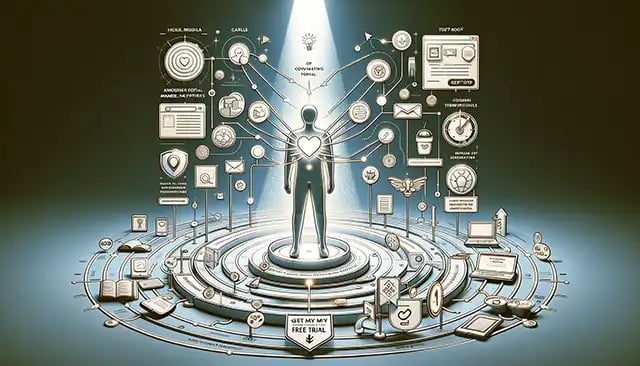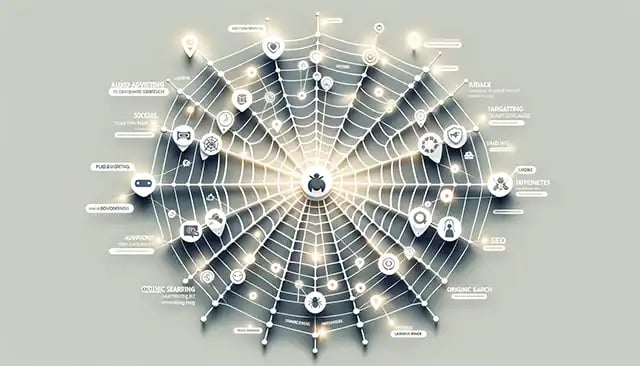What Is a Landing Page? Boost Your Lead Gen Efforts Now
- Home
- What Is a Landing Page? Boost Your Lead Gen Efforts Now
Imagine a digital front door, tailored to greet each visitor with just the right message. That's what a landing page is—a standalone web page created specifically for lead generation in marketing campaigns that guide visitors towards one particular goal. Picture this: You've crafted an enticing ad or social media post, and now you want people to take action—sign up, buy, learn more. A good click-through landing page makes all the difference here; it focuses your audience on that single action and cuts out any website navigation distractions. This focus can be crucial in turning those search engine visitors into leads or customers—an essential step in the marketing funnel designed to maximize conversion rates.
What is a landing page? It's where potential becomes actual—it’s where browsers become buyers. By reading further, you'll understand how effective these pages are at generating leads and why they're often separated from your main site for specific purposes reasons as promoting an ebook or showcasing features of real estate properties.
Table Of Contents:
- Defining the Landing Page and Its Core Purpose
- The Anatomy of an Effective Landing Page Design
- Showcasing Real-World Examples of High-Converting Landing Pages
- Leveraging HubSpot for Building Optimized Landing Pages
- Strategies for Attracting Traffic to Your Landing Pages
- FAQs about What is a Landing Page
- Conclusion

Defining the Landing Page and Its Core Purpose
A landing page is where the magic happens in digital marketing. It's like a specialized agent with one mission: to convert visitors into leads or customers. Unlike general website pages, which often serve various functions, a landing page serves a specific purpose within your marketing funnel.
What Makes Landing Pages Essential for Marketing Campaigns
If you're wondering what sets apart these powerhouses from regular webpages, think laser-focused content versus encyclopedia entries. They are crafted to target people effectively—zeroing in on your audience targeting strategy—and make sure potential customers only have eyes for what you offer.
Landing pages eliminate distractions by cutting out excess website navigation; this means when someone clicks through from social media posts or email marketing links, they land right where you want them—on that high-converting real estate. By providing relevant content without sidebars filled with other offers or links, there's less chance of users wandering off track before taking the desired action.
The beauty of good landing pages lies not just in their ability to increase traffic but also in their prowess at improving conversion rates dramatically—a focused user journey can do wonders here.
Landing pages are your digital secret agents, laser-focused on converting visitors into leads. They're like a bullseye for your marketing efforts, cutting through the clutter and directly targeting potential customers.
CTAs are your superpower—make them pop to guide users effortlessly towards conversion. Remember, nothing beats clear directives.
Nothing says 'trust me' on landing pages quite like social proof and testimonials. It's about making newcomers feel at home and ready to commit.

The Anatomy of an Effective Landing Page Design
Picture a digital marketing funnel—your landing page sits at the very heart, working tirelessly to convert visitors into leads and customers. It's where all your efforts converge, whether from social media posts or Google Ads, making its design pivotal for high engagement and conversion rates.
Crafting Compelling Calls-to-Action
A good landing page grabs attention with a clear call-to-action (CTA) button that stands out like a beacon, guiding users on what to do next. The best practices for landing page design suggest it should scream click me. But not literally—that'd be weird. A/B tests have shown us time and again that even small tweaks in CTA design can lead to significant upticks in user response.
To encourage users effectively, keep CTAs simple yet powerful. Use active language that resonates with your target audience’s desires—think 'Get My Free Trial' instead of just 'Submit'. Remember: when someone clicks this magical button they're saying yes to you; make sure they know exactly what they’re getting into.
Incorporating Trust Elements Like Social Proof
Social proof is the friend who whispers "This is legit" as potential customers ponder their buying decision on your sales landing page. Testimonials from people who've been there before them offer reassurance while trust badges showcase features recognized by others as trustworthy—a double whammy of credibility.
Design elements don't stop at aesthetics; incorporating social proof directly influences how much trust visitors gain about your offering upon arrival—the fast loading times won't hurt either. Adding real-life stories gives a greater chance for connection because let's face it—we all love a good story especially if we can see ourselves in it.
Check out some shining examples here.
Showcasing Real-World Examples of High-Converting Landing Pages
When you land on a stellar real estate landing page, it's like walking into an open house and immediately knowing you're right at home. These pages are fine-tuned to get potential buyers' contact info faster than a hot property flies off the market. They often showcase features in such an inviting way that visitors can almost picture their furniture in the space.
Real Estate Landing Pages That Drive Property Inquiries
The best real estate landing pages aren't just about pretty pictures; they're strategically crafted for lead-gen success. Imagine having a digital salesperson working around the clock, gathering leads while you sleep—that's your landing page. With enticing imagery and compelling copy that zeroes in on target people looking for their dream home, these pages do more than just spark interest—they start conversations.
A great example would be a page where every click-through lands potential customers onto virtual tours so immersive they'd swear they could reach out and touch the quartz countertops. Add customer testimonials as social proof, and boom—you've got trust built right into your layout. A strong CTA button is non-negotiable here; think 'Schedule Your Viewing Today.' over 'Learn More.' This direct approach turns casual browsers into eager inquiries—just ask anyone who’s clicked through.
Dive deep into examples of effective real estate landing pages (and pick up pointers along the way).
Crafting Compelling Calls-to-Action
If there was ever a secret sauce to high conversion rates, crafting compelling CTAs might just be it—it's what makes users take action after all. Take this ebook landing page example: imagine offering exclusive insights with titles like "10 Secrets Every First-Time Homebuyer Should Know." Now slap on a button that says ‘Get My Free Ebook’ against an eye-catching background colour.
This tactic isn’t pushy; it’s a smart marketing funnel play designed to convert visitors by providing immediate value—the free trial strategy but make it ebooks. Not only does this method collect email addresses from interested parties (hello email marketing), but it also warms them up for future communication channels whether through social media posts or targeted paid advertising campaigns based on demographic data gleaned from sign-ups.
Incorporating Trust Elements Like Social Proof
No one likes being first at anything—unless we’re talking front-row concert tickets maybe—but when making big decisions like buying property? People want evidence others have leapt at them. So why not plaster your sales landing offers clear as day?
- 'Over 1,000 happy homeowners started here'
Top-notch real estate landing pages act like 24/7 digital sales agents, using stunning visuals and persuasive copy to turn site visitors into leads. They feature virtual tours that feel so real you'll think you're there, while social proof and bold CTAs like 'Schedule Your Viewing Today.' convert curiosity into action.

Leveraging HubSpot for Building Optimized Landing Pages
Building an optimized landing page with HubSpot is like finding the perfect spot in a crowded room to pitch your idea. It's all about location, or in digital terms, creating that special space where your potential customers land after clicking on a Google ad or one of your social media posts.
Customizing Templates for Brand Consistency
The beauty of using HubSpot as a landing page builder lies in its customizable templates. Think of these templates as the blueprint to maintain a brand identity while simplifying the creation process. With drag-and-drop functionality and easy-to-edit features, you can quickly transform any template into a unique reflection of your brand without needing to code from scratch.
This means more time focusing on what matters—your marketing campaigns—and less time wrestling with design elements. The result? A professional-looking page that resonates with your target audience and gives them a seamless experience users expect when they click through from an email marketing message or paid social advertisement.
You'll find customizing templates not only helps ensure visual consistency across various pages but also saves valuable resources by allowing marketers to replicate successful designs efficiently—an essential strategy when running multiple A/B tests to optimize conversion rates further.
Crafting Compelling Calls-to-Action
A compelling call-to-action (CTA) button acts like that charming host who guides guests towards the main event—a desired action such as signing up for a free trial or downloading an ebook. Crafting CTAs within HubSpot is straightforward; it offers clear options so visitors understand exactly what step they should take next without getting lost in website navigation clutter.
To nail this element down, think about what makes someone push through the checkout flow at their favourite online store—it's usually because they know precisely what benefits await upon completion. That same clarity must be present here: strong verb usage and standout design will encourage users to take action. Discover more about crafting effective CTAs here.
Incorporating Trust Elements Like Social Proof
Add some muscle behind those persuasive words by incorporating trust elements such as social proof directly onto your landing pages created via HubSpot’s platform. Whether showcasing features alongside customer testimonials or highlighting how many people have already made the buying decision you're encouraging others towards—this tactic increases credibility exponentially. Social proof could include quotes from satisfied customers, case study summaries, and awards received by products/services offered—all providing tangible evidence backing up claims made throughout content pieces aimed at generating leads successfully.
HubSpot turns landing page creation into a breeze with its customizable templates. Just drag, drop, and edit to reflect your brand—no coding needed.
Your CTAs should be like that clear sign pointing the way at a busy store; make them strong and straightforward to guide visitors right where you want them.
Bolster your pitch by showing off the social proof. Customer love notes, awards, or user numbers add weight to your claims and build trust instantly.

Strategies for Attracting Traffic to Your Landing Pages
If you build it, they might come...but only if you've got the right strategies in place. A landing page sits there, waiting to convert visitors like a spider's web glistening with morning dew - but spiders don't just wait; they attract. Let's take that same approach and talk about how to drive traffic so your pages can do their job.
Using Social Media Posts
Social media is not just for sharing cat memes or what you had for lunch today – it’s a powerhouse marketing channel that can lead potential customers straight to your doorstep. By crafting enticing social media posts, peppered with personality and pizzazz, we help them understand exactly why clicking through is worth their time. Whether it's showcasing features of an offer or teasing content from an ebook landing on these pages makes users eager to learn more.
But here’s the kicker: different platforms need different tactics. A sizzling tweet could fall flat on Facebook where longer stories thrive. It pays off big time when you create separate landing experiences tailored specifically for each audience segment across every platform.
Paid Advertising Options
Paid ads are like buying express tickets at an amusement park - they get people right up front without the lines (or organic search effort). From Google Ads designed around SEO keywords that target people actively searching, all the way through paid social targeting those who’ve shown interest by demographic data or behaviour patterns; these options let us zoom in on our ideal visitor profile.
The best part? We're talking serious trackability here – being able to see which ad variations bring in conversions thanks directly due A/B tests means knowing exactly where your investment is working hardest.
Audience Targeting
To increase traffic effectively isn’t just about casting wide nets into digital seas hoping someone bites—it’s strategic fishing using well-chosen bait. Audience targeting uses demographic data combined with interests and behaviours insights gleaned from tools like HubSpot to home-in-on individuals likely interested in what we’re selling before presenting offers clear as the day upon arrival at sales landings catered towards making buying decisions easy peasy lemon squeezy.
Leveraging Organic Search
You want folks finding your pages naturally from the search engines too because this kind of visit comes pre-qualified—they were looking something specific up when bam. There was Your Link sitting pretty atop search engine results due to diligent search engine optimization efforts geared towards increasing relevance within searches related to desired actions associated with offerings featured throughout various stages along customer journey maps defining overall funnel structure optimizing conversion rates end-to-end process completion times lower than average checkout flows resulting in a happy, satisfied, and returning clientele base over an extended period.
Don't just build a landing page; make it the spider that lures with crafted social posts, targeted ads, and SEO savvy. Each platform has its flavour for content that converts. Paying for ads? Track those clicks to see what sticks. Target audiences like you know them personally because, with data insights, you do. And never underestimate organic search—those visitors are gold.
FAQs about What is a Landing Page
What is a landing page on a website?
A landing page funnels visitors towards a specific action, like signing up or buying, separate from the main site.
Do I need a landing page if I have a website?
You do. A dedicated landing page targets your campaigns better than general web pages can.
What is the difference between a site page and a landing page?
A regular site page offers info and navigation. Landing pages focus on converting visitors into leads.
What is the difference between an entry page and a landing page?
An entry point can be any webpage; think of it as where you start. A landing spot crafted for conversion goals.
Conclusion
So, you've seen the power of a landing page. It's that special spot where clicks convert into actions—sign-ups, sales, and more. Remember what is a landing page? It’s your campaign's front-line soldier.
Dive in with design; make every element count for higher engagement. Start strong with CTA buttons—they're not just buttons; they’re beacons guiding visitors to take action.
Add trust elements like social proof because credibility can clinch the deal. Use real-world examples as blueprints to craft pages that truly perform.
Leverage tools like HubSpot for streamlined creation and brand consistency. Finally, drive traffic through smart strategies across social media posts, paid ads, and organic search.
Your takeaway? A great landing page gives you an edge by focusing user attention on taking one desired action—and now you know how to create one that converts effectively!


